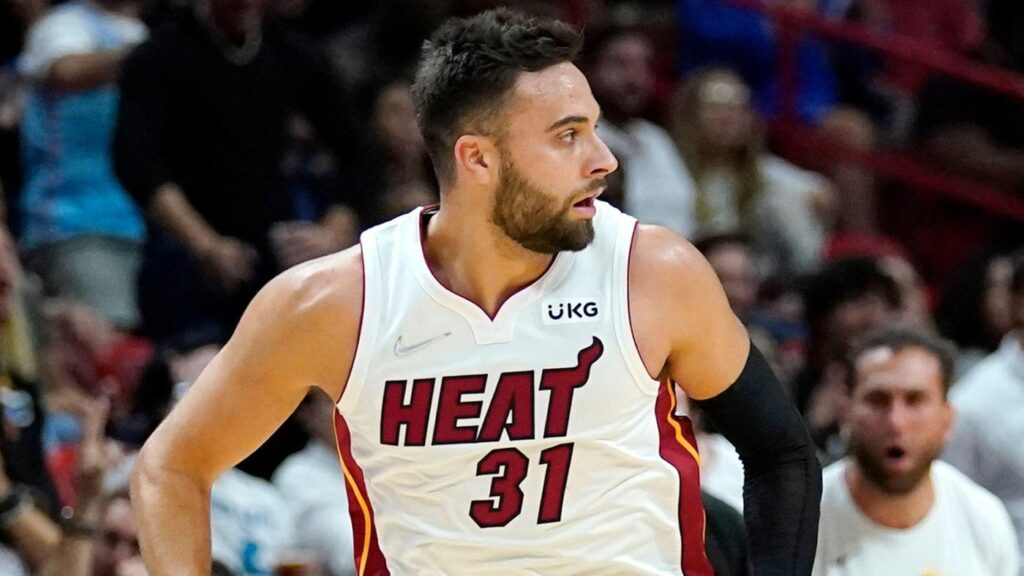
The most impactful officiating call of Game 7 of the Eastern Conference finals was made 1,300 miles from FTX Arena.
And it had nothing to do with the reason it was reviewed by the NBA’s Replay Center in Secaucus, N.J.
With 11:04 left in the third quarter of what turned into the Heat’s 100-96 season-ending loss Sunday to the Boston Celtics, Heat guard Max Strus converted a shot that was credited as a 3-pointer by the three-man officiating crew at FTX Arena, drawing the Heat within 56-54.
Or so Strus, the Heat, the Celtics, everyone in the arena and ESPN’s national audience thought.
All the while, veteran NBA referee Courtney Kirkland was at work in the league’s Replay Center, uncertain whether Strus might have stepped on the 3-point line.
So he initiated his own review, as play continued.
At that moment, Kirkland’s uncertainty solely was limited to whether the shot should have counted as three or two points.
By rule, the Replay Center cannot take control of such a play if the question is whether a player was out of bounds while in the motion of attempting such a shot. That is not an allowable trigger for replay-center review.
However — and this turned out to be a huge caveat — once such a review is triggered by the question of whether the basket was worth two or three points, then judgment also is allowed to determine whether such a player “committed a boundary-line violation.”
In Kirkland’s estimation, based on all the replay angles available to the NBA, beyond even those on the ESPN broadcast, Strus had stepped out of bounds. In such cases, the final decision rests with the Replay Center, and therefore is out of the hands of the on-site officiating crew.
So, in the end, no points on the play.
The ruling, however, was not announced until 8:28 remained in the third period, after three game stoppages in the interim for foul calls, with Boston’s lead growing to 13 points because of the reversal. The replay review was initiated during the first of those stoppages.
“The fact that it happened, three to four, five minutes in game time, that does change the context of how you’re playing,” Heat coach Erik Spoelstra said. “We were starting to gain some momentum. You feel like it’s a seven-, eight-point game and you look up and it’s a 13-point game, and there’s no other explanation for it other than it’s gone back to the league offices.
“You feel like if it happens like that, it should happen immediately and you can adjust accordingly.”
Had Strus been fouled on the attempt, replay review would have been immediate, to determine the appropriate amount of free throws to be awarded.
Spoelstra said he would not be surprised if the episode turns into a “case study” for how the league handles such decisions going forward.
“That was so unusual for us to be grinding and then start to get some momentum, and then it was like, ‘Oh, hey, by the way, take away that three,’ with no explanation,” Spoelstra said. “That’s the human side of it. That’s not the complaining side of it.
“Who knows if that would have changed anything, anyway?”
Butler’s big finish
With his 18 points in Sunday’s second quarter, Heat forward Jimmy Butler wound up with 17 double-digit quarters in his 17 appearances this postseason . . .
Butler on Sunday became the first Heat player to go all 48 minutes of regulation in a playoff game since Jamal Mashburn in Game 2 of the 2000 Eastern Conference semifinals against the New York Knicks . . .
With his 18th career playoff double-double Sunday, Heat center Bam Adebayo tied Chris Bosh for third on the Heat all-time playoff list, behind only the 31 of LeBron James and 22 of Dwyane Wade . . .
By falling in Games 2, 5 and 7 and it was the first time in their 34 seasons the Heat dropped three consecutive home games in the same playoffs series, and also the Heat dropped three consecutive home games in any postseason. The Heat had won their first seven home games this postseason before the losses to the Celtics.
()
